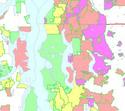We used to call it “Free Agent Nation.” Now, it seems like the new term of art will be “The 1099 Economy.” While the names may change, they all point to a phenomenon of rising importance: the growing number of Americans who don’t have a “regular job” but instead work on individual contracts with employers or customers. These folks don’t get the traditional W-2 paystub at the end of the year; they report their taxes with the IRS form 1099. read more »
Policy
Drones on the Prairie
When the Base Realignment and Closure Commission was drawing up its list of military installations to close back in 2005, consultants assured the city of Grand Forks, North Dakota, that its Air Force base would be spared. Days before the list was made public, though, word leaked out that Grand Forks was on the chopping block, after all. read more »
Can Florida Escape the Horse Latitudes?
When it comes to the winds of change, Florida remains in the horse latitudes. This zone of the Atlantic around 30 degrees latitude was so named by ship captains because their ships, becalmed in the water, seemed to move faster when they lightened their load by throwing off a few horses. Florida’s governor Rick Scott, who campaigned on a promise to create 700,000 jobs in this state, appears to have adopted the same tactic by throwing overboard the Department of Community Affairs, the state agency that regulated real estate development. Other bureaucracies may be next in line read more »
What To Look For In The Next President
As the 2012 election approaches, America is in a state of malaise. Massive debt, unfettered spending, economic decline and partisan divide have served to undermine the great American narrative that is predicated on optimism and a “can do” attitude.
As I assess the candidates for President, I will be looking for the one who most fully understands why we need to resurrect the compelling narrative for America. The compelling narrative has four basic components: read more »
- Login to post comments
The Rise Of The Third Coast: The Gulf Region’s Ascendancy In U.S.
For most of the nation’s history, the Atlantic region — primarily New York City — has dominated the nation’s trade. In the last few decades of the 20th Century, the Pacific, led by Los Angeles and Long Beach, gained prominence. Now we may be about to see the ascendancy of a third coast: the Gulf, led primarily by Houston but including New Orleans and a host of smaller ports across the regions. read more »
- Login to post comments
Enterprising States: Recovery and Renewal for the 21st Century
This is an excerpt from "Enterprising States: Creating Jobs, Economic Development, and Prosperity in Challenging Times" authored by Praxis Strategy Group and Joel Kotkin. The entire report is available at the National Chamber Foundation website, including highlights of top performing states and profiles of each state's economic development efforts.
Sweden: A Role Model for Capitalist Reform?
Sweden is often held up as a role model for those wishing to expand the size of government in the U.S. and other nations. The nation is seen as combining a large public sector with many attractive features, such as low crime rates, high life expectancy and a high degree of social cohesion.
But in actuality the success of the Swedish society lies not with the extent of its welfare state, but as the result of cultural and demographic factors as well as a favourable business environment throughout most of Sweden's modern history. read more »
Will the Last Family Leaving Seattle Please Turn out the Lights?
New Census data for the Seattle area's population changes, 2000-2010, permit a preliminary look at age and at types of households in the region. Let's look at patterns of geographic variation in selected age groups and household types for places in greater Seattle. It provides more evidence for how rapidly Seattle in particular is changing in fundamental ways. read more »
Why Compact Cities Aren't so Smart
I was interested to read the views of Rick Boven of the New Zealand Institute about central and local government needing to resolve their differences about the future of Auckland. Well, they have worked on that since the establishment of GUEDO in 2005 (now the Auckland Policy Office). read more »
Education as an Export
A trade deficit is a negative balance between a nation’s imports and its exports, so a country with a trade deficit is spending more on imports than it is receiving for selling its exports. Is there any more that can be done to reduce this deficit over the course of time? One potential solution the US trade deficit would be to increase the attractiveness of its higher education institutions to international students, and to therefore increase the amount of money coming into the country. Money from abroad that is spent in the US, such as on tourism, or in this case, on education, is considered an export. read more »






















